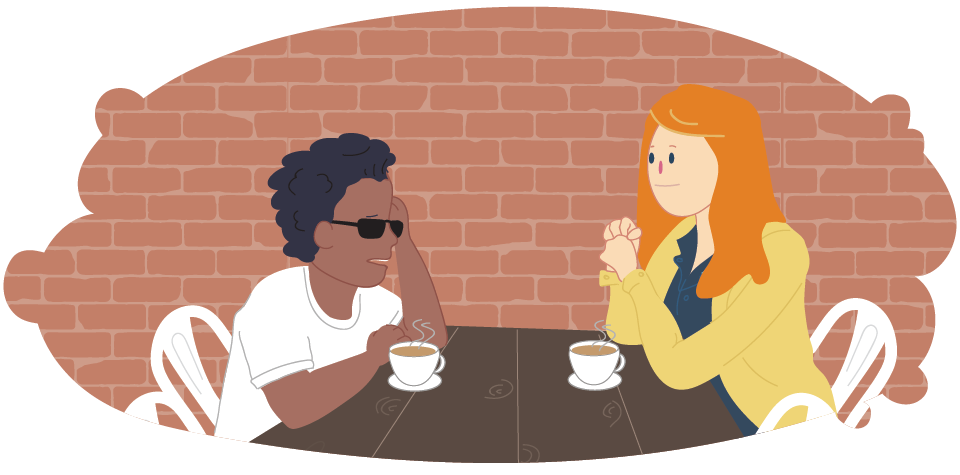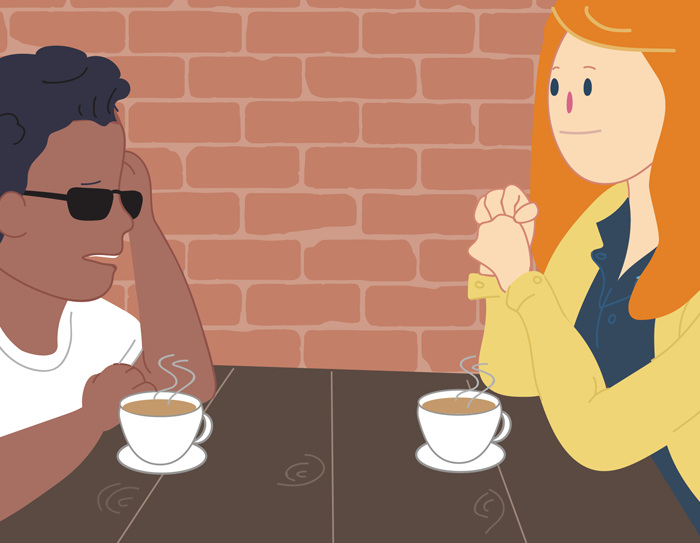Coming Out and Disclosure
Coming Out and Disclosure is a lifelong process about choosing whether you share your sexual and/or gender identity with important people in your life. Read on to find out more.

This article was written and reviewed by people in the LGBTIQA+ communities.
Coming Out vs. Inviting Others In vs. Disclosure
What’s the difference?
- LGBTIQA+ people usually go through a long process of questioning and discovering their sexuality and gender identity before deciding if they want to share this with others. There are some different ways people might describe this process.
- ‘Coming Out’ is a saying that means someone has decided to openly share their sexuality or gender identity with others in their life. This saying became popular during early gay and lesbian liberation movements to encourage others to be proud of and share their identities as a way of countering shame and secrecy.
- Some people don’t like this saying because they think it reinforces the belief that the LGBTIQA+ communities need the approval of the heterosexual and cisgender broader community for being different to them. (For example, “Oh, you’ve finally decided to be honest with us!”).
- ‘Inviting Others In’ is another saying that means openly sharing one’s sexuality or gender identity, or information about their body and medical history, but that implies more choice in how LGBTIQA+ people invite important people into their inner world as a gesture of love and trust. This is also seen as a way of being welcomed into LGBTIQA+ communities.
- Some people don’t like this saying because they think it gives the impression that there is always choice and that others will always respond positively, which is not always the case.
- Although similar, non-binary and Trans people’s experience of openly sharing their gender history or experience is better captured by the word ‘Disclosure’. Rather than sharing a concealed identity, their intention is to affirm an identity that is different to their assigned sex.
- Some people think Disclosure is a more neutral way of talking about 'Coming Out' and/or 'Inviting Others In'.
Challenges to sharing information about your sexuality, gender, body and history
- Many people have positive experiences Disclosing, when it is among people that are trustworthy and supportive.
- Because hetero-cis-normative and endosex culture is considered to be the norm, many people in LGBTIQA+ communities are in situations where they may be Disclosing regularly.
- Unfortunately, some people have negative experiences, like: feeling invalidated, being outed, major relationship conflicts, and being discriminated against. Some people may even experience discrimination and prejudice before Disclosing anything about themselves. For this reason, people in LGBTIQA+ communities are at a higher risk for developing mental health problems than others.
- To help keep themselves safe, some LGBTIQA+ people may be open about their identity or body in some contexts but private in other contexts. Some people might not acknowledge parts of their identity or body publically, like, introducing their non-heterosexual partner as a ‘friend’ or expressing non-binary gender in a more neutral way.
- With the tireless efforts of LGBTIQA+ rights advocates and allies – more young people are growing up in communities supportive of their sexual and gender identity and their bodies. For some, this means that many have had experiences where they have not needed to Disclose because their identity and body has never been an issue.
"When I was 16 I started dating this girl. She was amazing and all I wanted to do was tell the whole world."
Experiences for intersex people are often different
- Intersex people have bodies that don’t fit medical expectations for female or male bodies. Many intersex variations are genetic, and intersex people usually have a very different experience of discovery and disclosure to other people.
- This includes typically being told about their bodies by their parents or doctors. This can be a very medicalised experience, sometimes without having any say in the matter.
- People with intersex variations may not be able to associate their medical experiences with the word “intersex”, or the intersex community unless they have access to positive, accurate words and information about being intersex.
- Misconceptions about intersex variations are also barriers to self-acceptance and connecting with communities. Sometimes, sharing information about an intersex variation with others can be a lot like sharing a sexual or gender identity, but this isn’t true of everyone.
No two situations of Inviting Others In or Disclosures are the same
Some people may have to disclose both their sexual and gender identity with important people in their life.
Disclosure is something that people in LGBTIQA+ communities face in many unique ways. Usually more than once.
Even before they have Disclosed, some can experience anticipatory anxiety and grief about life changes and risks that may follow being open about their sexuality or gender.
People who identity as Asexual have a different experience of Disclosure to the rest of the LGBTIQA+ community, because of the misunderstanding that all people are sexual.
Discrimination is another issue for some people when Disclosing, even within LGBTIQA+ communities. For example, bisexual, non-binary, Trans, and asexual people may be discriminated because of misunderstandings about their identities.
The reality of rejection and discrimination means that many people need to consider their level of independence, living arrangements, financial situation and the cultural attitudes of the community they live in before Inviting Others In or Disclosing their identity.
Some people may have to navigate multiple conflicting identities when considering whether they will Disclose. For example, people from diverse cultural backgrounds may experience racism within the broader and LGBTIQA+ communities. Similarly, religious people may feel conflicted between their identity and their faith being a major source of support.
Tips for Inviting Others In and Disclosing in a safer way
"I had a lot of social anxiety. For me, I think I had this kind of repressed internal dialogue with my sexuality. I just lived on Google and I would literally good key words like, 'Gay' or 'Coming out'."
–Louis Hanson, Content Creator
Check these out too:
Sexual, gender and bodily diversity discrimination
Many LGBTIQA+ people face discrimination and prejudice that can affect their health, ...
READ MEGender Identity
There’s more to gender identity than being male or female. Learn ...
READ MESexual Identity
Relationships come in many forms. Learn more about sexuality and the different ...
READ MEExpressing your feelings
Expressing how you feel can help you cope when life throws you ...
READ METalking helps! We’re here for you.
No problem is too big or too small.
We're here 24 hours a day, 7 days a week






